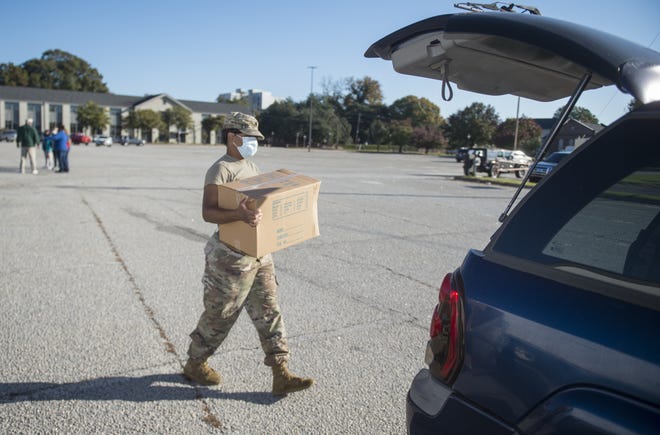
A new study on military families using food banks and pantries points to larger issues of economic insecurity, according to researchers at the University of Georgia and elsewhere who conducted the study.
The study found that among U.S. Air Force and U.S. Army enlisted personnel who applied for childcare support in spring of 2021, 13.2% had used some kind of food distribution within the past year.
“We went out looking into this data to see … how many military families are utilizing the available food distribution resources,” said Catherine O’Neal, an assistant professor at UGA in the Department of Human Development and Family Science and one of the authors of the study. “And then we’re interested to see if there were some trends that we can identify in which families were most likely to be utilizing those resources.”
While all the survey respondents were enlisted personnel, the researchers found that higher ranking troops were less likely to use food distribution resources than lower ranking ones. They also learned that Black, Asian and multiracial families were more likely to use the resources than White families.
The researchers also think that military families are actually under-using these resources as other research points to about one-quarter of military families living with food insecurity.

“We can’t tie these findings directly to the pandemic, but … families were a bit more insular during that time, and I feel like in some ways we’re still coming out of that,” said Mallory Lucier-Greer, professor in the Department of Human Development and Family Science at Auburn University and another author of the paper. This isolation could have limited their ability to access community resources.
As for why there is food insecurity in the military, O’Neal and Lucier-Greer said there were a number of factors that went into this, including financial literacy, issues with military spouses being able to find employment, and broader questions about whether pay and housing support were sufficient.
“Food insecurity … can be an indicator of kind of the higher level of need for financial security and financial wellbeing,” O’Neal said. “… We need to address that, of course, but that’s kind of a downstream effect. And so …. our work is really prevention geared like, ‘Let’s think upstream.’”
These underlying issues are also ones that the authors say the military is looking to address. In Georgia, Fort Eisenhower has worked closely with local organizations to provide troops access to services they need and destigmatize their provision.
“Golden Harvest Food Bank actually has been a tremendous resource and partner,” said Nomi Stanton, who works at GAP Ministries. Her husband, Gen. Paul Stanton, is commander of Fort Eisenhower and the Cyber Center of Excellence. “There is specific money that has been set aside for either military families or military children.”
Golden Harvest found money for a BackPack program to provide food for children at school on post, and providing food and turkeys during the holidays for qualifying families. Stanton also said that military resources on post have begun circulating resources for families who may need help accessing food.
Stanton also said Fort Eisenhower is making an effort to hire military spouses, who may otherwise struggle finding employment when they follow a spouse on a move, and holding job fairs. If they are struggling to find resources, she hopes spouses can attend town halls and reach out to base leaders.
“I think we are already doing the very first step, which is acknowledging (the issue), which is big, because there was a time when it was not something that was talked about,” Stanton said. “… We’re now sharing on email the food banks that are in the CSRA … you have no idea how much progress that is.”
Fort Stewart also works to monitor family needs through Army Community Services and chaplains. Service members who need help can be connected to resources on post, including food pantries and a Women, Infant, and Children facility, or to off post community organizations.
“Food insecurity is monitored by leadership through use of resources provided and we encourage Soldiers to speak up so they can get access and help from the resources we have available as part of our ongoing commitment to addressing the essential needs of our soldiers and their Families,” wrote Kevin Larson, chief of public communications for Fort Stewart.
This kind of access is important, Lucier-Greer said.
“If I got a chance to talk to legislators or (U.S. Department of Defense) policymakers, I would remind them that food distribution, resource utilization is a good thing,” she said. “These are the families that acknowledged the need within their family. They found out about resources and they engaged with those resources.”
The study’s authors say there are more questions to be asked about service members who are single, veterans, reserve troops and National Guard troops, but that the research they do is well received by the military.
“We have enjoyed our work with the military, because in our experience, they have been such an eager audience who truly values the research and wants to think through how their efforts and policies can be research informed,” O’Neal said.
